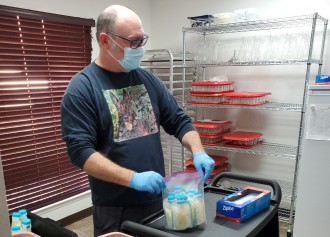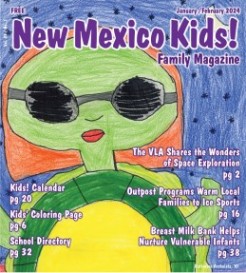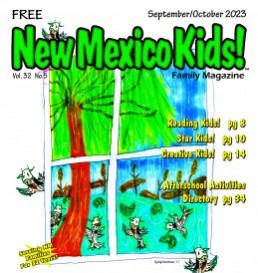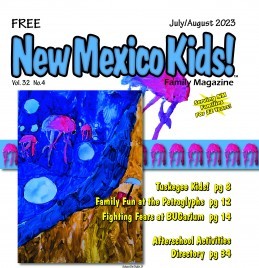Breast Milk Bank Helps Nurture Vulnerable Infants
Breast Milk Bank Helps Nurture Vulnerable Infants
February 6, 2024By TANIA SOUSSAN

After enduring fertility problems and a high-risk pregnancy, DaLin Broadwater was thankful to give birth to a healthy girl in December 2021.
She quickly had more to be thankful for and wanted to share her good fortune with others. Her daughter took to breastfeeding easily, and she was producing more than enough milk.
“I had an oversupply issue that was quite painful,” Broadwater said, adding that she pumped and filled her freezer with breast milk. “I thought, ‘I don’t believe how lucky I am to have such a sweet, healthy baby,’ and I wanted find ways to give back.”
Broadwater connected with the Human Milk Repository of New Mexico and was able to donate her excess breast milk for about a year before her supply regulated.
The milk bank, based in Albuquerque, collects donations from mothers like Broadwater and makes it available to babies in neonatal intensive care and others in need.
“The vast majority of our milk goes to premature, low birthweight, medically fragile infants,” said Executive Director Kael Marshall.
The repository also provides “bridge” milk to babies whose mothers are having trouble, perhaps because they are dehydrated or their milk just isn’t coming in right away. Babies of mothers who are incarcerated or taking drugs that prevent them from breastfeeding also can get health benefits from having breastmilk even for a short time, Marshall said.
“We want to increase breastfeeding rates, we don’t want to be a crutch,” Marshall said. “Mom’s own milk is always best.”
The repository, known as HMRNM, is the first and only mother’s milk bank in the state and is a 501c3 nonprofit accredited by the Human Milk Banking Association of North America since 2021. For more information, visit mothersmilkbanknm.org.
Plains Regional Medical Center, a Presbyterian Healthcare Services hospital in Clovis, coordinates a human milk donation and outreach center where area mothers can donate excess breast milk. The milk collected there is sent to Mothers’ Milk Bank in Colorado for distribution nationwide.
Marshall and his wife, Erin, started the Human Milk Repository of New Mexico after learning about necrotizing enterocolitis, which affects the intestines and colon of newborns. Babies with the serious condition have a high death rate when fed formula but do better on breast milk. The Marshalls both were touched and wanted to help.
At the time, Marshall was a stay-at-home dad of two children and ready to take on a new role that would “make a ripple” in the world and help others. Erin Marshall is involved as a board member and president.
HMRNM slowly grew and now needs to expand to accommodate increasing demand, Marshall said. The bank has 80 donors and expects to collect more than 60,000 ounces of milk in 2023, triple what it collected in its first year. That will be enough for 100,000 feedings, serving thousands of babies.
The repository has worked with the New Mexico Department of Health and Human Services to secure Medicaid coverage for milk for hospitalized babies. Private insurance does not cover human breast milk, and Medicaid does not cover it for outpatients, so the repository offers a scholarship that lowers the cost of 40 ounces of bridge milk to $150, approximately what it costs to process and supply it.
The milk bank operates in a building paid for by Erin Marshall’s law firm, but the space is becoming too small. More room is needed for additional staff, lab space and a shipping and receiving area. Marshall said it would cost $1 million to put in a new facility, and he has had trouble securing a new building.
In addition to what it charges for the milk and financial support from the law firm, the milk bank receives $25,000 a year from the Anderson Charitable Foundation in Texas. Marshall is exploring options for a public-private partnership with the state.
Donors can drop off breast milk at HMRNM in Albuquerque’s Northeast Heights. The Labor of Love program at nearby Lovelace Women’s Hospital also accepts donations. In addition, donors can drop off milk at Memorial Medical Center and Little Steps Pediatrics in Las Cruces and at San Juan Regional Medical Center in Farmington.
As a milk depot, Labor of Love maintains a giant chest freezer and offers a concierge service that allows moms to pull up in front and have someone come out to the car to collect their milk. That can be a real help to mothers who have a baby in tow.
“They bring so much milk to donate. It's astounding,” said Christina Silvis, a registered nurse who manages the Labor of Love program. “They have a variety of reasons for wanting to donate. Sometimes, they had a baby in the NICU. … it's kind of their way of giving back to support others.”
She said others have lost a baby and donating breast milk helps them work through their grief.
HMRNM takes precautions to ensure the safety of donor milk. Potential donors are carefully screened and undergo a blood test to make sure they don’t have an infection such as HIV or syphilis that can be passed through breast milk. Then, the donor milk is sent in batches to a California lab for bacterial screening.
About a year after her daughter was born, Broadwater’s family came down with COVID-19. Everyone was sick, but the baby sailed through.
“She had a runny nose twice, never ran a fever,” Broadwater said. “Because of the antibodies she got from me during the breastfeeding, she did so well.”
Silvis said the milk bank provides an even bigger immune system boost for babies. Because the bank combines milk from many donors, babies who receive it get antibodies — and the protection they provide — from many different moms.
“We love it,” she said. “Here at our NICU, they do utilize donated human breast milk because that is the best food for baby.”




